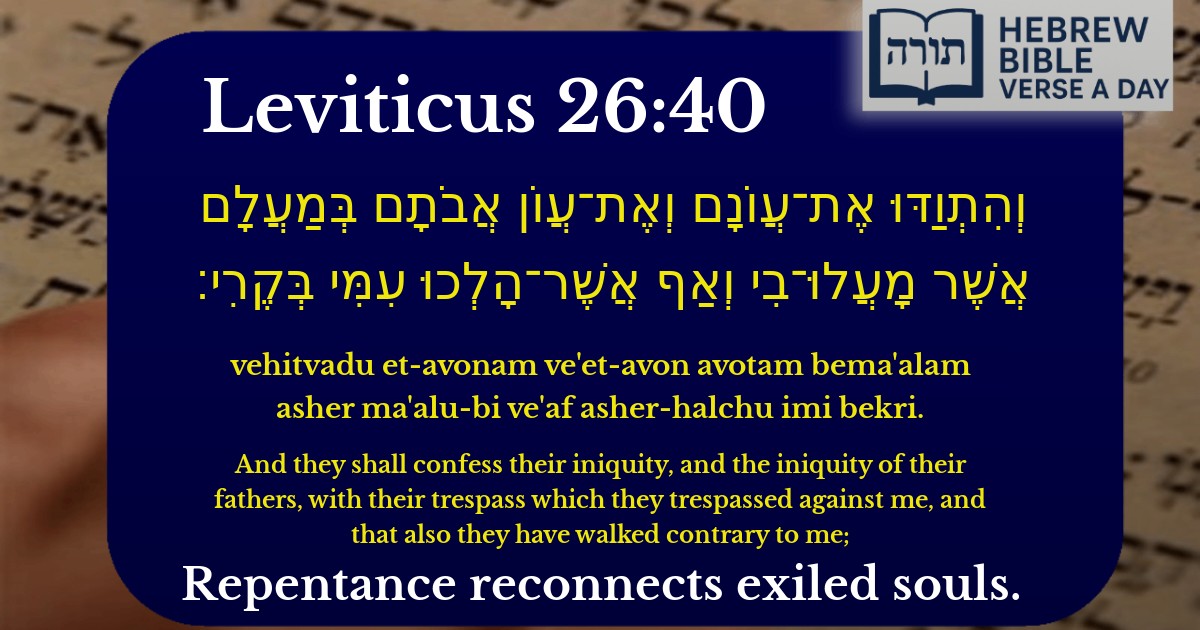Join Our Newsletter To Be Informed When New Videos Are Posted
Join the thousands of fellow Studends who rely on our videos to learn how to read the bible in Hebrew for free!
Hebrew Text
וְהִתְוַדּוּ אֶת־עֲוֺנָם וְאֶת־עֲוֺן אֲבֹתָם בְּמַעֲלָם אֲשֶׁר מָעֲלוּ־בִי וְאַף אֲשֶׁר־הָלְכוּ עִמִּי בְּקֶרִי׃
English Translation
And they shall confess their iniquity, and the iniquity of their fathers, with their trespass which they trespassed against me, and that also they have walked contrary to me;
Transliteration
Vehitvadu et-avonam ve'et-avon avotam bema'alam asher ma'alu-bi ve'af asher-halchu imi bekri.
Hebrew Leining Text
וְהִתְוַדּ֤וּ אֶת־עֲוֺנָם֙ וְאֶת־עֲוֺ֣ן אֲבֹתָ֔ם בְּמַעֲלָ֖ם אֲשֶׁ֣ר מָֽעֲלוּ־בִ֑י וְאַ֕ף אֲשֶׁר־הָֽלְכ֥וּ עִמִּ֖י בְּקֶֽרִי׃
וְהִתְוַדּ֤וּ אֶת־עֲוֺנָם֙ וְאֶת־עֲוֺ֣ן אֲבֹתָ֔ם בְּמַעֲלָ֖ם אֲשֶׁ֣ר מָֽעֲלוּ־בִ֑י וְאַ֕ף אֲשֶׁר־הָֽלְכ֥וּ עִמִּ֖י בְּקֶֽרִי׃
🎵 Listen to leining
Parasha Commentary
📚 Talmud Citations
This verse is quoted in the Talmud.
📖 Yoma 86b
The verse is referenced in the context of discussing the importance of confession (vidui) for repentance, particularly on Yom Kippur.
📖 Sanhedrin 43b
The verse is cited in a discussion about the necessity of confessing one's sins before execution, drawing a parallel to the biblical requirement of confession.


Confession of Iniquity in Vayikra (Leviticus) 26:40
The verse from Vayikra 26:40 discusses the concept of vidui (confession) as a prerequisite for repentance and redemption. The Torah emphasizes that the Jewish people must acknowledge not only their own sins but also the transgressions of their ancestors. This dual confession is essential for achieving full teshuvah (repentance).
Rashi's Explanation
Rashi (Rabbi Shlomo Yitzchaki) comments on this verse, noting that the phrase "וְהִתְוַדּוּ אֶת־עֲוֺנָם" ("they shall confess their iniquity") refers to verbal confession, a fundamental step in repentance. He explains that acknowledging sin aloud demonstrates sincerity and humility before Hashem. Additionally, Rashi interprets "וְאֶת־עֲוֺן אֲבֹתָם" ("and the iniquity of their fathers") as recognizing that later generations may have perpetuated the same sinful behaviors as their ancestors, thus bearing responsibility for correcting those patterns.
Rambam on Vidui
In Hilchot Teshuvah (1:1), the Rambam (Maimonides) elaborates on the necessity of confession, stating that one must specify their sins rather than offering a general admission. This aligns with the detailed phrasing in the verse: "בְּמַעֲלָם אֲשֶׁר מָעֲלוּ־בִי" ("with their trespass which they trespassed against me"). The Rambam teaches that true repentance requires both remorse and a commitment to change.
The Concept of "Walking Contrary" (בְּקֶרִי)
The term "בְּקֶרִי" ("contrary") is interpreted by the Midrash (Sifra Bechukotai 8:1) as implying a rebellious, willful rejection of Hashem’s commandments. The Kli Yakar (Rabbi Shlomo Ephraim Luntschitz) explains that this describes a mindset of indifference or defiance, where one disregards divine providence. True repentance requires abandoning this attitude and realigning with Hashem’s will.
Lessons from the Talmud
Practical Application
This verse underscores that repentance is not only personal but also communal. The Jewish people must collectively recognize historical and ongoing shortcomings to merit redemption. The Or HaChaim (Rabbi Chaim ibn Attar) adds that confessing ancestral sins inspires humility, as it reminds individuals that they are part of a larger spiritual legacy requiring correction.